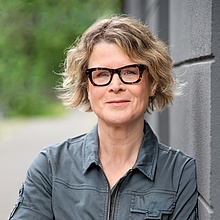

Contact
Press, Communications and Marketing
Tel.: +49 228 833-144
Fax: +49 228 833-441
presse[at]avh.de
Humboldt Foundation: Ms Schwalb, What do you think will be the consequences of the planned cuts for the Humboldt Foundation?
Antje Schwalb: In Germany we have attractive offers enabling international junior researchers to acquire further qualifications. I fear that we will lose a real advantage if the cuts mean fewer sponsorship opportunities can be offered, whether by the Humboldt Foundation or other organisations. It would be a huge loss – for research, for the researchers themselves and also for students here in Germany.
What does that mean exactly?
Fewer funding opportunities for international students mean less internationalisation at our universities and research institutions. And that, in turn, means that, as a science system, we will have fewer new perspectives and fewer opportunities to grapple with other, new perspectives that sometimes hold up a mirror to us. So, the planned cuts actually counteract the objectives, which are so central to German science and academia, of becoming more international and diverse.
You are active as an expert on the selection committee for the Humboldt Research Fellowship Programme, the Foundation’s largest programme. What impact are the cuts having there?
Up to now, the approval rate was roughly 30 percent – which I think is already quite tough. If the cuts go ahead, further reductions are unavoidable. It is already painful to see how many well qualified people we have to reject. Often, there are really very, very good applications from international junior researchers who are making the effort to come here themselves, who substantiate their applications very well and work extremely hard to get here. If the success rate falls any more potential applicants will ask themselves whether it is really worth submitting an application in the first place.
Does it affect your own research work as a professor and head of an institute?
I have collaborations with Mexico and other countries in Latin America, for example, and have built up a Chinese-German graduate school; members of my team have just returned from doing fieldwork in Tibet and Nepal. I myself did my doctorate in Switzerland and was a postdoc in the United States. A good third of my team are international junior researchers who in some cases have come, or want to come, on the strength of Humboldt Foundation or DAAD funding. I assume the cuts will have an impact here, too. I benefitted so much from the time I spent abroad that it is important to me to continue investing time and energy in developing international cooperation and networks. It’s motivating and makes me embark on new avenues in my research. If we just stew in our own juice, we become poorer – not just in the field of research.
What do you mean precisely?
I am surprised that the political significance of international research collaboration is often neither noticed nor called upon. As researchers, we are ambassadors when we cooperate with colleagues from other countries. We experience political and social developments at first hand and often go through difficult phases in the course of a collaboration; we acquire experience in maintaining contact and dialogue, nonetheless. I see a lot of potential for utilising this political added value to greater effect. But then there would have to be a focus on the things that drive us researchers instead of making cutbacks: gaining knowledge by exciting joint research and promoting international exchange as a by-product along the way.

Professor Dr Antje Schwalb has been at TU Braunschweig since 2002. She is head of the Institute of Geosystems and Bioindication which she founded in 2012. The environmental and palaeoclimate researcher is chair of the Board of Trustees of the Federal Institute for Geosciences and Natural Resources. She has been a member of the Humboldt Foundation’s selection committee for the Humboldt Research Fellowship Programme since 2019 and was previously a member of the VolkswagenStiftung’s Board of Trustees as well as on various DFG committees.
